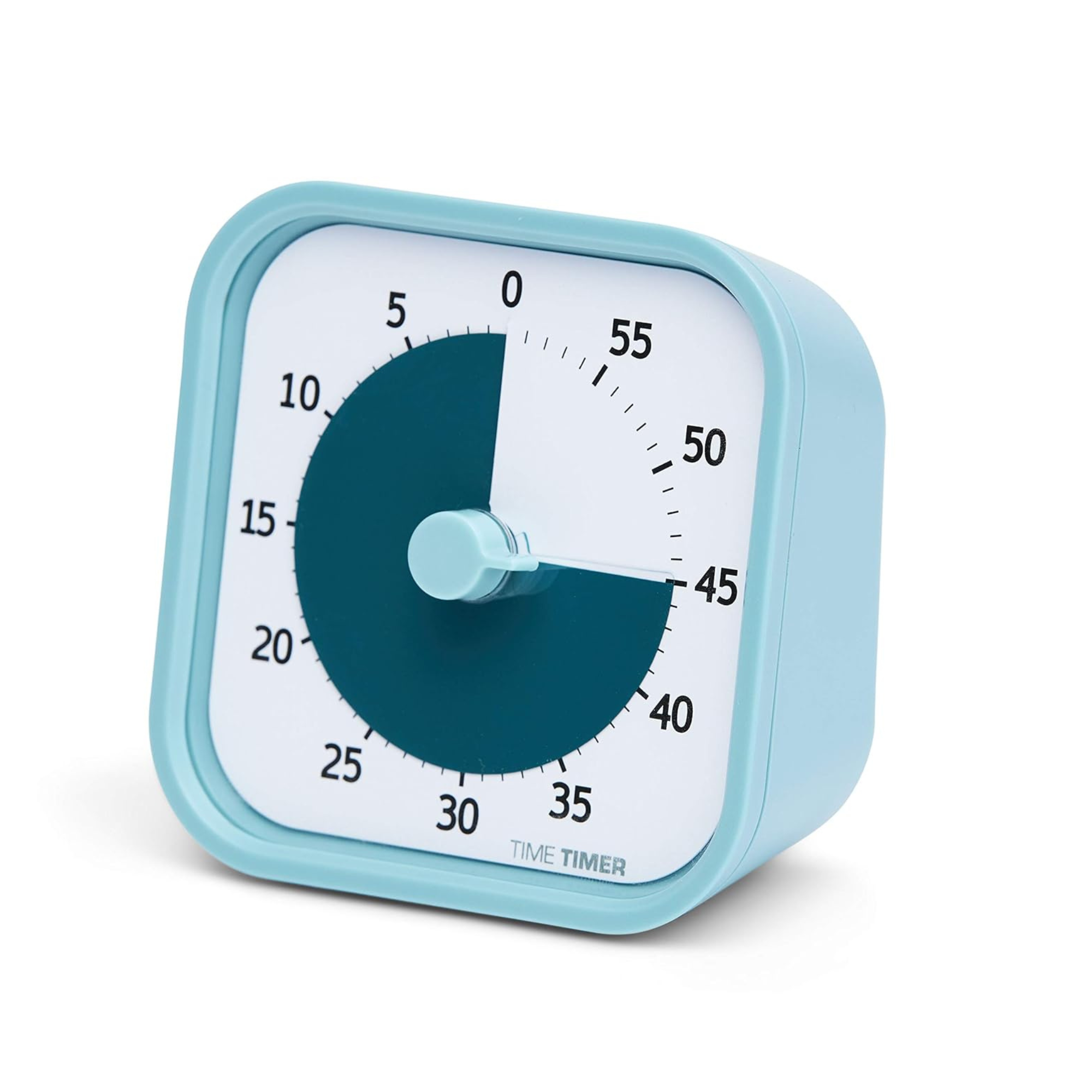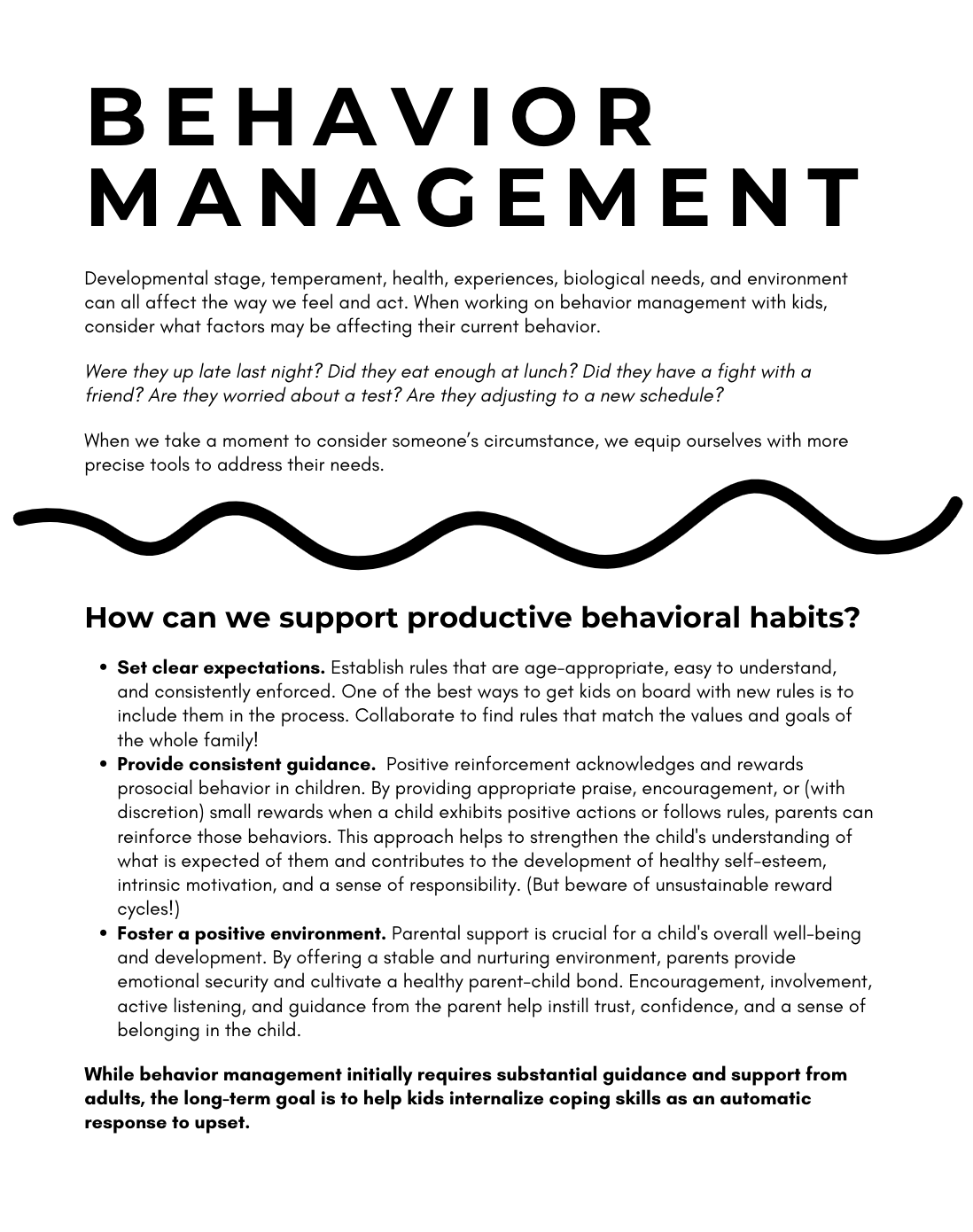Behavior Management Tools & Tips
Practical Guidelines for Balanced Behaviors
Our behavior is influenced by a multiplicity of factors.
Developmental stage, temperament, health, experiences, biological needs, and environment can all affect the way we feel and act. When working on behavior management with kids, consider what factors may be affecting their current behavior.
Were they up late last night? Did they eat enough at lunch? Did they have a fight with a friend? Are they worried about a test? Are they adjusting to a new schedule?
When we take a moment to consider someone’s circumstance, we equip ourselves with more precise tools to address their needs.
How can we support productive behavioral habits?
Set clear expectations. Establish rules that are age-appropriate, easy to understand, and consistently enforced. One of the best ways to get kids on board with new rules is to include them in the process. Collaborate to find rules that match the values and goals of the whole family!
Provide consistent guidance. Positive reinforcement acknowledges and rewards prosocial behavior in children. By providing appropriate praise, encouragement, or (with discretion) small rewards when a child exhibits positive actions or follows rules, parents can reinforce those behaviors. This approach helps to strengthen the child's understanding of what is expected of them and contributes to the development of healthy self-esteem, intrinsic motivation, and a sense of responsibility. (But beware of unsustainable reward cycles! Learn more about that here.)
Foster a positive environment. Parental support is crucial for a child's overall well-being and development. By offering a stable and nurturing environment, parents provide emotional security and cultivate a healthy parent-child bond. Encouragement, involvement, active listening, and guidance from the parent help instill trust, confidence, and a sense of belonging in the child.
While behavior management initially requires substantial guidance and support from adults, the long-term goal is to help kids internalize coping skills as an automatic response to upset.
Here are some of our favorite tools to help develop and reinforce coping skills and self-control:
Every kid is different and we have to tailor behavior management plans to their individual needs and abilities. For some kids, positive behavior charts are very successful. We recommend collaborating with the child to create clear and attainable goals, expectations, and rewards. The idea is to set the child up for success while also maintaining age-appropriate expectations. It’s ok if the the goals need to be adjusted, but refrain from using punishment or threats as part of the behavior chart.
For example, once a child earns a sticker on the chart, the sticker cannot be taken away for “bad” behavior later. This creates a sense of security in positive progress—maybe they won’t move forward on the chart every day, but they will never move backwards.
Click HERE for our FREE printable behavior chart!
Visual timers can aid in the development of time management skills and the ability to navigate transitions. Whether counting down for activities or creating a sense of predictability, visual timers promote a comforting sense of control and contribute to decreased transitional tantrums.
Examples: We sit together at the dinner table for at least 10 minutes. Baths are no longer than 15 minutes. We have to leave for school in 30 minutes. I will play with you in 20 minutes.
This is a great visual resource, but we would make a few adjustments to the design. Instead of “good” or “bad,” we prefer “prosocial” (considerate of others) and “antisocial” (inconsiderate of others) to help kids understand the nuances of behaviors and motivations.
Unlike “bad behaviors,” antisocial behaviors are not always bad. Examples: sometimes not sharing is reasonable; sometimes yelling is standing up for ourselves; sometimes ignoring someone is setting a boundary.
It is important to teach kids that human behaviors are complex and they are not being “bad” when they exercise their own complexities.
Screen time can lead to mismanaged and/or dysregulated emotions. According to a study by Oflu et al. (2021), “investigating the relationship between the emotion regulation skill and screen time revealed that excessive screen time is associated with emotional lability in this early childhood period.”
So what can we do? “We can reduce the possible negative impacts of excessive screen time and promote children's healthy development and well-being by increasing knowledge and encouraging alternative activities that stimulate development” (Muppalla et al., 2023).
Open-ended toys, enriching books, and screen-free audio are all great alternative activities! This audio player offers kids the freedom of choice within a curated selection of stories, music, and podcasts—all simplified for independent use by kids aged 3 and up!
Promote calm, mindful moments while practicing time management and adaptability skills.
Taking space (or a time-out) when we are upset is a long-standing way to regain emotional regulation, but in the midst of a tantrum, many kids struggle to see the value of a time-out. Liquid timers are a great alternative to the traditional “go to time-out!” Here’s how:
In moments of calm, establish the timer as a peaceful, playful tool that can help us relax (Look how the colors are dancing! Those two are floating down together. Look what happens when the two colors overlap—a new color is made!). Then, in times of upset, the timer can reemerge to help soothe while applying a covert time-out to reestablish emotional regulation.
Tip: After establishing the timer as “relaxing,” limit its availability to the child in order to maintain novelty. Novelty increases the timer’s effectiveness as a calm-down tool.
When we teach kids about coping skills, our hope is that they will be able to employ them independently according to their own emotional management system. Tools like Breathing Buddy encourage kids to practice breathing techniques without the help of an adult.
Teaching kids mindful breathing exercises goes beyond just calming the mind; it empowers them with a lifelong skill of emotional regulation.
A visual lay-out of the day can help kids (and parents!) stay organized, understand expectations, and feel prepared for what’s ahead. Mental preparation can reduce anxiety and the accompanying behaviors (tantrums, refusal, rumination) and encourages self-efficacy.
Nighttime and morning behaviors are often a struggle for parents. A sunrise simulation alarm/night light can help. Freedom within limits can help establish the expectations of this device. For example: What color nightlight would you like tonight? Remember, we stay in bed until the white light is on in the morning.
These expectations are strengthened with positive reinforcement. You followed your light alarm, pick out a sticker for the chart! After a good night of sleep, we have enough energy to go to the park!
Books About Behavior
Learning to manage emotions and behaviors is an essential part of a child's growth and development. Our behavior collection introduces kids to the complexities of conduct through an empathetic perspective and promotes tools for adaptive expression. The books in this selection create space for children to explore, understand, and reflect on their behavior and the behavior of their peers.
Explore our full selection of recommended children’s books in our Book Lists tab!
Behavior Management Hand-Out
A printable version of this information is available in our Infographics tab!
REFERENCES
Maggi, S., Zaccaria, V., Breda, M., Romani, M., Aceti, F., Giacchetti, N., Ardizzone, I., & Sogos, C. (2022). A Narrative Review about Prosocial and Antisocial Behavior in Childhood: The Relationship with Shame and Moral Development. Children, 9(10), 1556. https://doi.org/10.3390/children9101556
Muppalla, S. K., Vuppalapati, S., Pulliahgaru, A. R., & Sreenivasulu, H. (2023). Effects of Excessive screen time on Child Development: An Updated review and Strategies for Management. Cureus. https://doi.org/10.7759/cureus.40608
Oflu, A., Tezol, O., Yalcin, S., Yildiz, D., Caylan, N., Ozdemir, D., Cicek, S., & Nergiz, M. (2021). Excessive screen time is associated with emotional lability in preschool children. Archivos Argentinos De Pediatria, 119(2). https://doi.org/10.5546/aap.2021.eng.106











